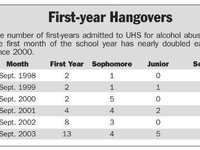With more and more Harvard students hospitalized for severe alcohol abuse, University officials have launched an initiative to look into new ways to curtail irresponsible drinking, from adjusting social attitudes to expanding treatment options.
Dean of the College Benedict H. Gross ’71 will announce today a committee charged with investigating how administrators, students and University health officials can prevent and reduce binge drinking.
According to Gross, the committee will not seek to clamp down on student parties or tighten regulations, but will instead address what he perceives to be the social problem of alcohol abuse at Harvard.
Gross’ announcement comes after 24 undergraduates were treated by University Health Services (UHS) for alcohol poisoning this September—a substantial increase from the 15 admits for alcohol-related illnesses last September.
The committee, established by Gross and University Provost Steven E. Hyman, will be chaired by Currier House Master Joseph L. Badaracco and is expected to produce a set a recommendations for ways to improve alcohol education and treatment by this spring.
Harvard’s Board of Overseers had pushed for the creation of a committee following discussions with concerned parents and in reaction to the spike in hospitalizations, according to Gross and Hyman. University President Lawrence H. Summers has also voiced support for the committee, whose other members have not yet been made public.
Gross said he hopes to spark discussion at the University about irresponsible alcohol consumption and, more broadly, the social dimensions of drinking. The committee will seek input and advice from students, administrators and medical experts, he said.
Specifically, efforts will be made to improve UHS’s response to crises as well as expanding counseling and support for students with recurring alcohol problems.
“The main goal is to reduce heavy drinking, via educational and therapeutic programs,” Gross said. “I’m doing this because I think it’s a serious health problem.”
Hyman said that the problem needs to be addressed from the dual perspective of prevention and response.
“The goal is not to have a committee that meets and declares victory because we’ve had a meeting,” Hyman said. “The goal is to properly address the many sides of the problem with binge drinking, ranging from health risks to academic problems to sexual assault.”
Though Gross declared his interest in the issue of alcohol last spring following the release of the Leaning Committee’s report to address sexual assault at Harvard, Gross said that his concerns were heightened by the UHS statistics.
Gross said that while it appears that the number of people drinking regularly has remained somewhat level over the past ten years, the number of people who are getting dangerously sick has gone up considerably, especially among women.
He also said he is concerned that students may trivialize the dangers of alcohol use.
“People joke about alcohol abuse now, like they used to joke about drug abuse and date rape when I was in college,” Gross said. “Last year, we had a discussion of sexual violence on campus, and put a program in place to address it. I think it’s now time to discuss the dangers and consequences of alcohol abuse.”
Read more in News
Black Female Alums Celebrate Third Decade














